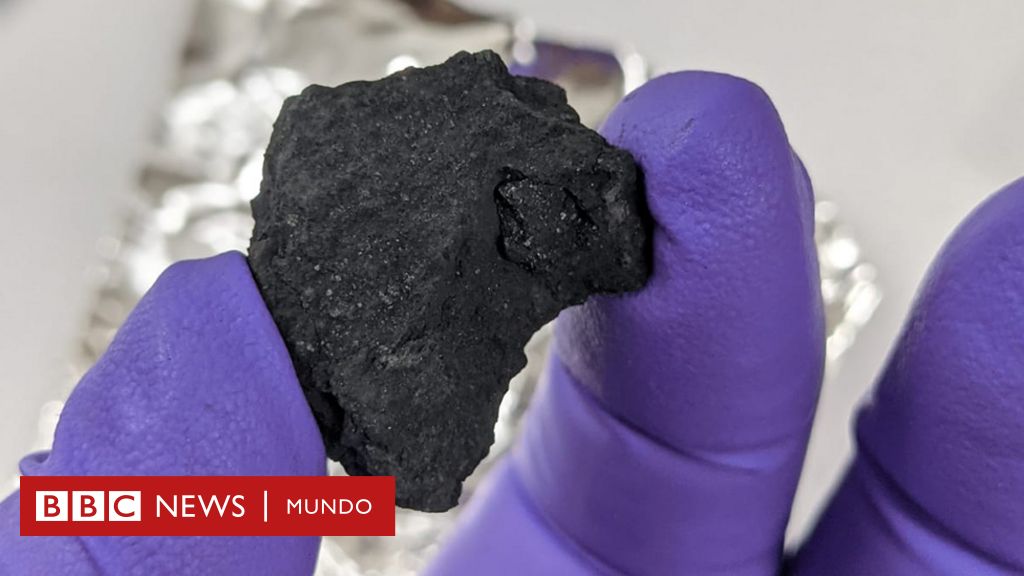The amazing meteorite that fell on a town in England provides new clues about how Earth’s water was formed

- Jonathan Amos
- BBC Science Correspondent
The Winchcombe meteorite has separated from a larger asteroid passing between Mars and Jupiter.
A meteorite that crashed in Winkcombe, UK, last year contained almost as much water as Earth.
This reinforces the idea that rocks from space brought key chemical components, including water, to the planet early in its history, billions of years ago.
The meteorite is the most important meteorite recovered in the United Kingdom.
The scientists who published the first detailed analysis say so He brought up some great ideas.
More than 500 grams of black residue was collected from local gardens and the fields in which it fell, after A A giant fireball will light up the night sky.
The dismembered remains were carefully cataloged at the then Natural History Museum (NHM) in London Loaned to teams from all over Europe To investigate.
image source, Getty Images
A simulation of what villagers in England might have seen in the sky.
represents even water 11% of the meteorite’s weightand contained a very similar ratio of hydrogen atoms to water on Earth.
Some scholars say so Earth, in its smallest stage, It was so hot that it would expel much of its volatile contents, including water.
That there is so much water on Earth today (70% of its surface is covered by oceans) suggests that there must have been a later addition.
Some say this could come from a Icy comets bombard, but their chemistry doesn’t add up.
However, carbonaceous meteorites (Winchcombe-like meteorites) certainly do.
image source, Getty Images
70% of the earth is covered by water.
And the fact that meteorite fragments It will recover after less than 12 hours From collapsing means that it has absorbed very little groundwater, or indeed any pollutants.
“Every other meteorite has been compromised in some way by the terrestrial environment,” study co-author Ashley King, from NHM, told BBC News.
But Winchcombe is different because The speed at which it was captured.
“This means that when we looked at it, we knew that the structure we’re looking at takes us back to the formation at the beginning of the solar system, 4.6 billion years ago.”
“Except for searching for rock samples from an asteroid with a spacecraft, We couldn’t get a more pure sample.”
Researcher Ashley King.
Scientists who examined meteorite organic compounds containing carbon and nitrogen, including amino acids, obtained a Equally clean image.
This is the kind of chemistry that can be the raw material for Biology was allowed to begin on Earth primitive.
The new analysis also confirms the meteorite’s origin.
accurate path
Camera images of the fireball allowed the researchers to determine a very precise trajectory.
account in reverse, They discovered that the meteorite came from the outer asteroid belt between Mars and Jupiter.
The Winchcombe material was recently sold at auction for more than 120 times its weight in gold.
image source, NHM
meteorite part
Further investigation revealed that it had been separated from a larger asteroid, likely in some collision.
Later, It took 200,000 to 300,000 years to reach Earthas indicated by the number of specific atoms, such as neon, created in the meteorite material by the continuous irradiation of high-speed space particles, or cosmic rays.
0.2-0.3 million years seems like a long time, however From a geological perspective, it’s actually very fastsaid Helena Bates, from NHM.
“The carbonaceous chondrites have to get here quickly or they won’t survive, because they’re so crumbly, they might break off.”
image source, NHM
More secrets
The scientists’ first analysis, in this week’s issue of Science Advances, is just an overview of the properties of the Winchcombe meteorite.
Dozens of articles will be published soon More on the specialized topics in an issue of Meteoritics & Planetary Science.
And even they will not be the last word.
The researchers will continue to work on this sample for years to come. Reveal more secrets about the origins of our solar system,” said study co-author Luke Daly of the University of Glasgow.
Remember that You can receive notifications from BBC Mundo. Download and activate the new version of our application in order not to miss our best content.

“Evil coffee nerd. Analyst. Incurable bacon practitioner. Total twitter fan. Typical food aficionado.”

:quality(70):focal(288x128:298x138)/cloudfront-us-east-1.images.arcpublishing.com/metroworldnews/4VWFN4IMGFGQTCCSYSVPIJDM4A.jpg)









